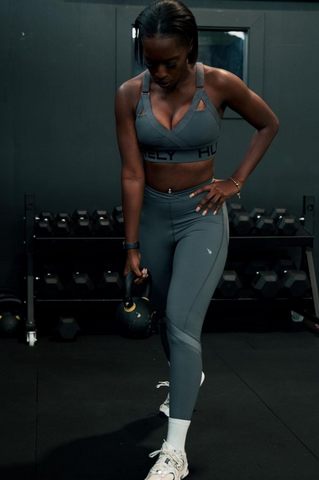MICHAEL NWAEZE
Setting SMART Fitness Goals and Tracking Progress



Setting SMART Fitness Goals and Tracking Progress
NewsMICHAEL NWAEZE
Setting fitness goals is like embarking on a journey. Just like any journey, having a roadmap makes the difference between wandering aimlessly and reaching your destination with purpose.
In the world of fitness, setting SMART goals provides that roadmap, guiding you toward success while ensuring accountability and measurable progress.
Whether you're aiming to shed a few pounds, build muscle, or improve your overall health, having a well-defined plan and tracking your progress can make a significant difference in your success.
In this comprehensive guide, we'll explore the art of setting SMART goals and the importance of tracking your progress
Understanding the Concept of SMART Goals
Fitness goals come in all shapes and sizes, but not all goals are created equal. SMART is an acronym for Specific, Measurable, Achievable, Relevant, and Time-bound. These principles ensure that your goals are clear, actionable, and conducive to success.
1. Specific: Define Your Objective
Your goals should be clear and well-defined, leaving no room for ambiguity. Instead of setting a vague goal like "get in shape," aim for something more specific, such as "lose 10 pounds" or "run a 5K in under 30 minutes."
2. Measurable: Quantify Your Progress
Quantifiable goals make it easier to track your progress and determine when you've achieved success. For example, "increase my squat weight by 20 pounds" or "reduce my body fat percentage by 5%." Having concrete metrics helps you stay accountable and motivated.
3. Achievable: Set Realistic Goals
While it's important to challenge yourself, your goals should also be realistic and attainable. Setting unrealistic expectations can lead to frustration and demotivation. Be real with yourself and ensure your goals are aligned with your current fitness level and lifestyle.
4. Relevant: Align Goals with Your Values
Ensure your goals align with your overall fitness vision and personal values. Ask yourself why achieving this goal is important to you. Are you aiming to improve your overall health, boost your confidence, or achieve a specific athletic milestone? This will help you stay focused and motivated. If your goal doesn't resonate with you or doesn't contribute to your larger objectives, it may be harder to stay committed.
5. Time-bound: Set a Deadline
Establishing a clear timeline for achieving your goals adds a sense of urgency and accountability. Break down your long-term objectives into smaller, manageable milestones and set specific deadlines or target dates to work towards.
Why Goal Setting is Crucial for Fitness Success
1. Motivation and Focus:
Having clear and defined goals provides direction and purpose, keeping you motivated and focused on your fitness journey. When you know exactly what you're working towards, it becomes easier to stay committed and push through challenges.
2. Accountability:
Setting goals holds you accountable for your actions and progress. It's harder to make excuses or stray from your path when you have specific targets to meet.
3. Measuring Progress:
Goals serve as benchmarks, allowing you to track your progress and celebrate milestones along the way. Seeing tangible results can be incredibly motivating and encourage you to maintain your momentum.
Tools For Tracking Your Fitness Progress
Tracking your progress is crucial for maintaining motivation and making adjustments to your plan as needed. It allows you to celebrate milestones, identify areas for improvement, and gauge the effectiveness of your approach. Fortunately, there are numerous tools available to help you monitor your journey:
- Fitness Trackers and Wearables: From step counters to calorie trackers, technology offers a variety of apps and devices to monitor your activity levels, heart rate, sleep patterns, and more. These devices can provide valuable insights into your progress and help you make informed decisions about your fitness routine.
- Workout Journals: Keep a detailed log of your workouts, including the exercises performed, weight or resistance used, and any personal records achieved. Many fitness apps offer workout-tracking capabilities, making it easier to track improvements and identify patterns or areas for improvement. on the go.
- Progress Photos: Taking regular progress photos can be a powerful motivator, allowing you to visually track changes in your physique over time. Consider taking photos from multiple angles and under consistent lighting conditions for accurate comparisons.
- Body Measurements: In addition to weight, track your body measurements such as waist circumference, chest, arms, and thighs. These measurements can provide insights into changes in muscle mass and body composition, even when the scale doesn't move.
Tips and Strategies To Achieve Your Fitness Goal
Celebrate Milestones
As you reach your short-term goals or hit significant milestones, take the time to celebrate your achievements. This will reinforce your motivation and serve as a reminder of how far you've come.
Adjust Your Goals as Needed
As you progress on your fitness journey, it's essential to reevaluate your goals periodically and adjust them as needed based on your progress, preferences, and changing circumstances:
- If you've achieved a goal ahead of schedule or if circumstances have changed, adjust your goals accordingly to keep them relevant and challenging.
- If you're not seeing the desired results or experiencing plateaus, don't be afraid to modify your approach. Experiment with different workout routines, nutrition plans, or recovery strategies to find what works best for you.
- If you're struggling to set appropriate goals or make progress, consider seeking guidance from a certified personal trainer or fitness professional. They can provide personalized advice and support to help you achieve your goals safely and effectively.
Maintain Consistency
Consistency is the cornerstone of success in fitness. Establishing daily habits and routines can help you stay on track even when motivation wanes. Remember, progress is not always linear, but staying committed to your goals will yield results over time.
Stay Accountable and Motivated
Throughout your fitness journey, you may encounter obstacles such as injuries, plateaus, lack of time, or waning motivation. It's important to anticipate and prepare for these challenges to stay on track.
Accountability and motivation go hand in hand. Find a workout buddy or join a fitness community to hold each other accountable and provide support. Having someone to share your journey with can make a significant difference in staying motivated.
You may also consider setting up a reward system for achieving specific goals or milestones. Treat yourself to something you enjoy (within reason) to reinforce positive behavior and celebrate your accomplishments.
Be Stylish
More than anyone cares to admit, feeling good in your workout gear elevates your confidence and makes exercise more enjoyable. You should consider workout gear that flatters your body shape, makes you feel confident, and aligns with your personal style preferences.
You can explore our collection of high-quality workout gear, designed to meet your fitness needs while looking good and confident.
Conclusion
Achieving your fitness goals is a journey, and every step you take brings you closer to unlocking your full potential.
Setting SMART goals and tracking your progress are essential components of a successful fitness journey.
Upgrade your fitness journey with our premium workout gear, designed to support you every step of the way. Visit our store to explore our collection of high-quality activewear and accessories to help you stay motivated and comfortable during your workouts. Take the first step towards your goals today!
FAQs
How often should I reevaluate my fitness goals?
It's generally recommended to reevaluate your goals every 4 to 6 weeks, or whenever you achieve a significant milestone. This allows you to adjust your goals based on your progress and ensure they remain relevant and challenging.
What if I'm not seeing progress despite following my plan?
If you're not seeing the desired results, don't be discouraged. Reevaluate your goals, modify your approach, and consider seeking guidance from a fitness professional. Sometimes, small adjustments to your routine or nutrition can make a big difference.
How can I stay motivated when I hit a plateau?
Plateaus can be frustrating, but they're a normal part of the fitness journey. Try changing up your routine, increasing the intensity or duration of your workouts, or adjusting your nutrition plan. Additionally, celebrate the progress you've made so far and remind yourself of your "why."
Should I set multiple goals at once or focus on one at a time?
It's generally better to focus on one or two primary goals at a time, especially when starting your fitness journey. Having too many goals can be overwhelming and lead to a lack of focus. As you progress, you can incorporate additional goals or adjust your priorities.
What if I don't meet my deadlines for achieving fitness goals?
It's okay to adjust your deadlines if needed. Focus on progress rather than perfection, and be flexible in adapting your timeline to suit your evolving needs and circumstances.
Can I use fitness trackers and apps to set and track my goals?
Absolutely! Many fitness trackers and apps allow you to set and monitor specific goals, such as daily step counts, calorie intake/burn, or workout durations. These tools can be incredibly helpful for tracking your progress and staying accountable to your goals.



No comments available